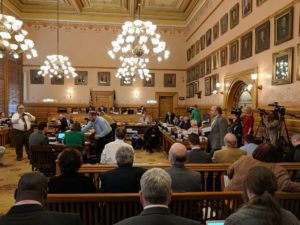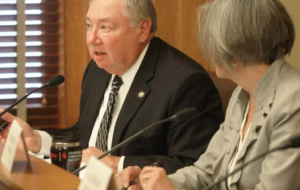 Conservatives who demanded that the Legislature take no action on school finance until a new cost study was available – a study conducted under their parameters by a consultant that they chose – are now trying to distance themselves from that study and discredit it.
Conservatives who demanded that the Legislature take no action on school finance until a new cost study was available – a study conducted under their parameters by a consultant that they chose – are now trying to distance themselves from that study and discredit it.
It was conservative Republicans who insisted on doing a new cost study, arguing that the prior studies by Augenblick and Myers and the Legislative Post Audit were outdated. “You can’t take such old studies and just adjust them for inflation!” they cried. “Times have changed!”
And so, over the objections of the Democrats, Republican House and Senate Leadership approved hundreds of thousands of dollars to hire two attorneys and a consultant to conduct a new cost study. They chose a consultant, Dr. Lori Taylor of Texas A&M University, to conduct the study and Senate President Susan Wagle (R-Wichita) told the Wichita Eagle that they had hired a consultant to demonstrate that the state was adequately funding schools.
“We’re focused on finding experts who can help show the court that funding is adequate,” Susan Wagle, R-Wichita (Wichita Eagle, Feb. 23, 2018).
A lot of people who work under the dome thought that was just what the Legislature would get; that Taylor had been hired to give Wagle what she wanted. Republican leaders held up all discussion of school funding and a response to Gannon in anticipation of this study. See this from an article in Lawrence Journal-World on March 11, 2018:
Senate Majority Leader Jim Denning, R-Overland Park, also rejected the idea that the results of the study were predetermined.
“They’re unfounded in that,” he said. “We have no idea what she’s going to come back with. But we know that we have to update the study.”
Denning said the estimates that Kansas needs to add upwards of $600 million to its education budget are largely based on cost estimates done in 2002 and 2003, during an earlier school finance lawsuit, with those figures simply updated for inflation.
Today, though, Denning was leading the attack to reject or discredit the report. He challenged it on the performance thresholds that were being used, suggesting that use of the approved state ESSA (Every Student Succeeds Act) plan was not appropriate. In other words, if we lower our performance goals, we could lower the cost of education.
were being used, suggesting that use of the approved state ESSA (Every Student Succeeds Act) plan was not appropriate. In other words, if we lower our performance goals, we could lower the cost of education.
Denning even went so far at one point as to refer to the study as “simply an academic exercise, not a financial one.” Still, it was an “academic exercise” that Denning was hanging his hat on earlier as a way to block increases in education funding.
Conservatives have for years been swayed by the rhetoric of Dave Trabert and the Kansas Policy Institute. In fact, if the state had a dollar for every time Trabert said “money doesn’t matter” or “schools are terribly inefficient,” there might have been enough money in the treasury to pay for this study.
Instead, the report specifically says this about funding increases:
“…a one percentage point increase in academic performance is associated with a 5 percent increase in cost. Similarly, a one percentage point increase in the graduation rate is associated with a 1.2 percent increase in cost at lower grades and a 1.9 percent increase in cost at the high school level.” (page 61)
As for efficiency, the report noted that “the average cost efficiency score was 0.956, indicating that buildings were producing nearly 96% of the potential output, on average.” (page 63) And one slide in Dr. Taylor’s presentation said, “Systematically school districts are exceedingly good at the efficient use of their resources.”
What Can We Expect Moving Forward?
The report still needs to be fully digested by legislators. We can expect that talks will begin soon about how best to address the Gannon decision in light of this new report.
We would anticipate that conservative legislators will launch an effort to discredit the report or consider other ways to bring down costs. Denning, as we said earlier, has already hinted at reducing the state’s performance goals and referred to the study as simply an “academic exercise.”
Conservatives might also renew their calls for constitutional amendments either limiting the state’s responsibility for education funding or stripping the Supreme Court of the authority to act.
Since the consultants also suggest a longer timeline for phasing funding in, cooler heads will likely begin to discuss how long that might be as well as how to lock in increases over time even as membership in the legislature changes. It is often noted that today’s legislative decisions are not binding on future legislatures.
The study will give conservatives more to complain about but might also give Democrats and Moderates just the boost they need to put together a coalition plan to meet the Gannon ruling.
But no matter what, they need to get cracking! Briefs are due to the Supreme Court on April 30!


